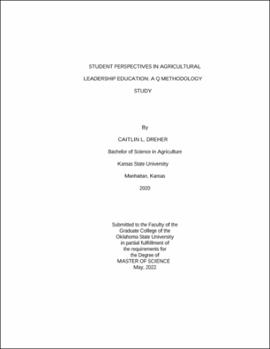| dc.contributor.advisor | Riggs, Angel | |
| dc.contributor.author | Dreher, Caitlin L. | |
| dc.date.accessioned | 2023-04-03T20:51:45Z | |
| dc.date.available | 2023-04-03T20:51:45Z | |
| dc.date.issued | 2022-05 | |
| dc.identifier.uri | https://hdl.handle.net/11244/337247 | |
| dc.description.abstract | Agriculture serves as one context where leadership education programs are implemented in collegiate curriculum. Agricultural leadership education programs are becoming prevalent, with 26 existing programs across the nation (Alexander et al., 2017). Coursework in agricultural leadership education programs differs from that of other leadership education programs because it teaches the foundations of leadership contextually in agricultural sciences (Weeks & Weeks, 2020). | |
| dc.description.abstract | The importance of leadership to students could be a reason why agricultural leadership education is chosen as an undergraduate major (Schumacher & Swan, 1993); however, a variety of factors go into selecting majors (Beggs et al., 2008; Germeijis et al., 2012;
Herren et al., 2011; Malgwi et al., 2005.) Many factors can contribute to students choosing a specific major (Galotti, 1999), but reasons students decide to major in agricultural leadership is largely unknown. | |
| dc.description.abstract | Decision-making style (Scott & Bruce, 1995) was used as the conceptual framework for this study. Although decision making is habit-based, it can change based on the situation and be represented by five different decision making styles. This framework helped the researcher to interpret and understand students’ perspectives of their choice to major in agricultural leadership. | |
| dc.description.abstract | Q methodology allows for a better understanding of the varying student perceptions of their undergraduate agricultural leadership education program. Q methodology works to reveal individuals’ diverse and distinctive viewpoints instead of displaying only one specific perspective of a group of individuals (McKeown & Thomas, 2013). Participants with varying experiences and perspectives were selected (Watts & Stenner, 2012). All participants were currently enrolled in undergraduate agricultural leadership education programs at three universities. | |
| dc.description.abstract | This study identified two perspectives of student opinions within undergraduate agricultural leadership education. The first perspective represents those students with leadership experience before college and appreciate the personal and professional development that the major offers. The second perspective represents students who are relationship oriented and agree the degree is transferrable between disciplines. All students within the second perspective changed their major to agricultural leadership from something else during their college career. Findings are consistent with Schmacher and Swan (1993) in determining students agree that leadership is important to their college education. | |
| dc.format | application/pdf | |
| dc.language | en_US | |
| dc.rights | Copyright is held by the author who has granted the Oklahoma State University Library the non-exclusive right to share this material in its institutional repository. Contact Digital Library Services at lib-dls@okstate.edu or 405-744-9161 for the permission policy on the use, reproduction or distribution of this material. | |
| dc.title | Student perspectives in agricultural leadership education: A Q methodology study | |
| dc.contributor.committeeMember | Cline, Lauren Lewis | |
| dc.contributor.committeeMember | Terry, Jr., Robert | |
| osu.filename | Dreher_okstate_0664M_17650.pdf | |
| osu.accesstype | Open Access | |
| dc.type.genre | Thesis | |
| dc.type.material | Text | |
| dc.subject.keywords | agriculture | |
| dc.subject.keywords | education | |
| dc.subject.keywords | higher education | |
| dc.subject.keywords | leadership | |
| dc.subject.keywords | Q methodology | |
| dc.subject.keywords | recruitment | |
| thesis.degree.discipline | Agricultural Education | |
| thesis.degree.grantor | Oklahoma State University | |
